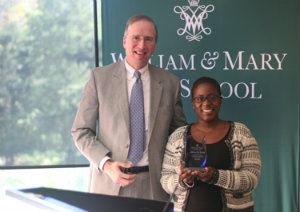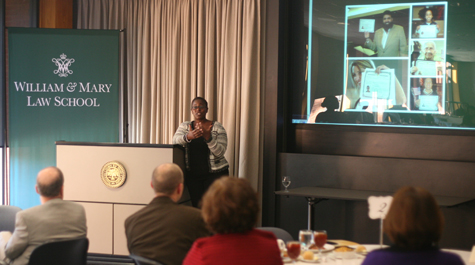Professor Angela Banks on Respectability Narratives and the Quest for Citizenship
How is the discussion framed, and whose values are brought to the fore, when we talk about immigration and access to citizenship in our national debates? Professor Angela Banks shared perspectives informed by her current research on these and other questions at the recent Blackstone Lecture at the Law School. The annual lecture, presented during a faculty luncheon, recognizes the scholarly achievements of younger faculty members.
Nancy Combs, Goodrich Professor of Law at William & Mary and director of the Law School’s Human Security Law Center, introduced Banks. She characterized her work as “multi-disciplinary,” “wildly researched,” and “bold,” with a perspective shaped by her graduate study in sociology at Oxford. Banks, she said, “looks at the most pressing issues, in particular of immigration law, through a broad, multidisciplinary perspective that illuminates connections and lines of thought that we simply would not see if were focused narrowly on law and legal policy.”
In her lecture Banks focused on “respectability narratives” as one strategy advocates use “to change the social meaning attached to immigrant groups that have been denied legal rights.” She noted that the concept of a “politics of respectability” was first advanced by historian Evelyn Brooks Higginbotham in her study of advocates’ efforts in the late nineteenth and twentieth centuries to expand the legal rights and improve the social status of African-American women. It was legal historian Kenneth Mack, she added, who explored the “legalist strand” of the concept, “which makes claims for legal rights based on arguments that the marginalized group has the same values, norms, and practices as mainstream society and therefore deserves the requested legal rights.”
 Banks focused her luncheon presentation on the conflicting narratives about Chinese immigrants advanced by legal decision-makers and advocates in key times in American history when changes to immigration law were hotly debated. For example, her research documented a “problem” narrative about Chinese immigrants evident in opinions expressed by some senators in an 1870 debate that effectively blocked a change in law that would have allowed Chinese immigrants to naturalize. Some of these senators, for example, said Banks, characterized Chinese immigrants as “pagan imperialists” and “likened them to slaves … [who] would never assimilate into mainstream American culture.” Banks illustrated how decades later in 1943 the repeal of the Chinese Exclusion Act may have been made possible in part by advocates utilizing a respectability narrative that resonated with legal decision-makers’ and the public’s conception of what makes individuals worthy of citizenship. Among the examples Banks cited, advocates “argued that Chinese immigrant and American morals were the same” and “described Chinese immigrants as committed to the rule of law.” The repeal of the act, however, was a very limited victory, she noted. Lawful entry to the United States by people of Chinese descent at that time remained limited to only 105 individuals each year under a special quota system.
Banks focused her luncheon presentation on the conflicting narratives about Chinese immigrants advanced by legal decision-makers and advocates in key times in American history when changes to immigration law were hotly debated. For example, her research documented a “problem” narrative about Chinese immigrants evident in opinions expressed by some senators in an 1870 debate that effectively blocked a change in law that would have allowed Chinese immigrants to naturalize. Some of these senators, for example, said Banks, characterized Chinese immigrants as “pagan imperialists” and “likened them to slaves … [who] would never assimilate into mainstream American culture.” Banks illustrated how decades later in 1943 the repeal of the Chinese Exclusion Act may have been made possible in part by advocates utilizing a respectability narrative that resonated with legal decision-makers’ and the public’s conception of what makes individuals worthy of citizenship. Among the examples Banks cited, advocates “argued that Chinese immigrant and American morals were the same” and “described Chinese immigrants as committed to the rule of law.” The repeal of the act, however, was a very limited victory, she noted. Lawful entry to the United States by people of Chinese descent at that time remained limited to only 105 individuals each year under a special quota system.
In her conclusion, Banks pointed to the contemporary use of respectability narratives, noting that it has been a strategy used by advocates for a pathway to citizenship for DREAMers (children of undocumented migrants), for example. She also raised a powerful question: what do respectability narratives say about our conceptions about who is and who is not worthy of citizenship?
About William & Mary Law School
Thomas Jefferson founded William & Mary Law School in 1779 to train leaders for the new nation. Now in its third century, America's oldest law school continues its historic mission of educating citizen lawyers who are prepared both to lead and to serve.
